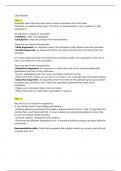Overig
Notes of all Victor Gijsbers philosophy clips (1.1/5.5) University of Leiden
- Instelling
- Universiteit Leiden (UL)
This document contains a summery of all the information given by Victor Gijsbers in his youtube videos on philosophy. These video are part of the course: Wetenschapsfilosophie/Science of philosophy at the University of Leiden
[Meer zien]




